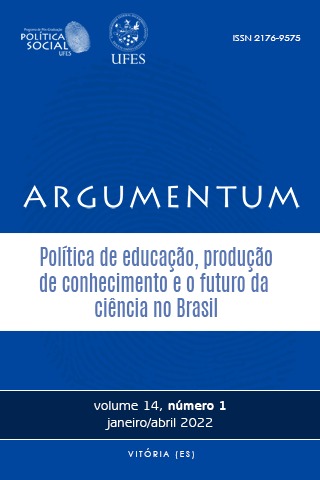Direitos sociais, cidadania e gestão democrática: contribuições para o debate crítico
DOI:
https://doi.org/10.47456/argumentum.v14i1.37278Resumo
O objetivo deste estudo é descrever as relações que envolvem a gestão democrática, os direitos sociais e a cidadania, sob o cenário do Estado Democrático de Direito. Desenvolve-se uma análise quanto às implicações para os arranjos sociais, notadamente aqueles com maiores índices de fragilidade, no que diz respeito à redução, à supressão ou à cessação dos direitos sociais em territórios aparentemente democráticos. O enredo teórico é consubstanciado por considerações sobre os fatores que dão entorno à ordem democrática e a aspectos que supostamente garantem uma democracia legitimada apenas pelo direito ao sufrágio universal. Infere-se que uma gestão democrática pressupõe a adoção de políticas públicas visando ao bem comum, voltadas para o atendimento das demandas da sociedade por meio de ações sistemáticas e permanentes de combate à pobreza e à mitigação das desigualdades sociais.
Downloads
Publicado
Edição
Seção
Licença
Termo de Cessão de Direitos Autorais
Como condição para a submissão, os autores devem concordar com o Termo de Cessão de Direitos Autorais, marcando a caixa de seleção após a leitura das cláusulas.
O(s) autor(es) doravante designado(s) CEDENTE, por meio desta, cede e transfere, de forma gratuita, a propriedade dos direitos autorais relativos à revista Argumentum, do Programa de Pós-graduação em Política Social, Universidade Federal do Espírito Santo - Av. Fernando Ferrari, 514 - Goiabeiras 29075-910, Vitória (Brasil) doravante designada CESSIONÁRIA, nas condições descritas a seguir:
1. O CEDENTE declara que é (são) autor(es) e titular(es) da propriedade dos direitos autorais da OBRA submetida.
2. O CEDENTE declara que a OBRA não infringe direitos autorais e/ou outros direitos de propriedade de terceiros, que a divulgação de imagens (caso as mesmas existam) foi autorizada e que assume integral responsabilidade moral e/ou patrimonial, pelo seu conteúdo, perante terceiros.
3. O CEDENTE cede e transfere todos os direitos autorais relativos à OBRA à CESSIONÁRIA, especialmente os direitos de edição, de publicação, de tradução para outro idioma e de reprodução por qualquer processo ou técnica. A CESSIONÁRIA passa a ser proprietária exclusiva dos direitos referentes à OBRA, sendo vedada qualquer reprodução, total ou parcial, em qualquer outro meio de divulgação, impresso ou eletrônico, sem que haja prévia autorização escrita por parte da CESSIONÁRIA.
4. A cessão é gratuita e, portanto, não haverá qualquer tipo de remuneração pela utilização da OBRA pela CESSIONÁRIA.

